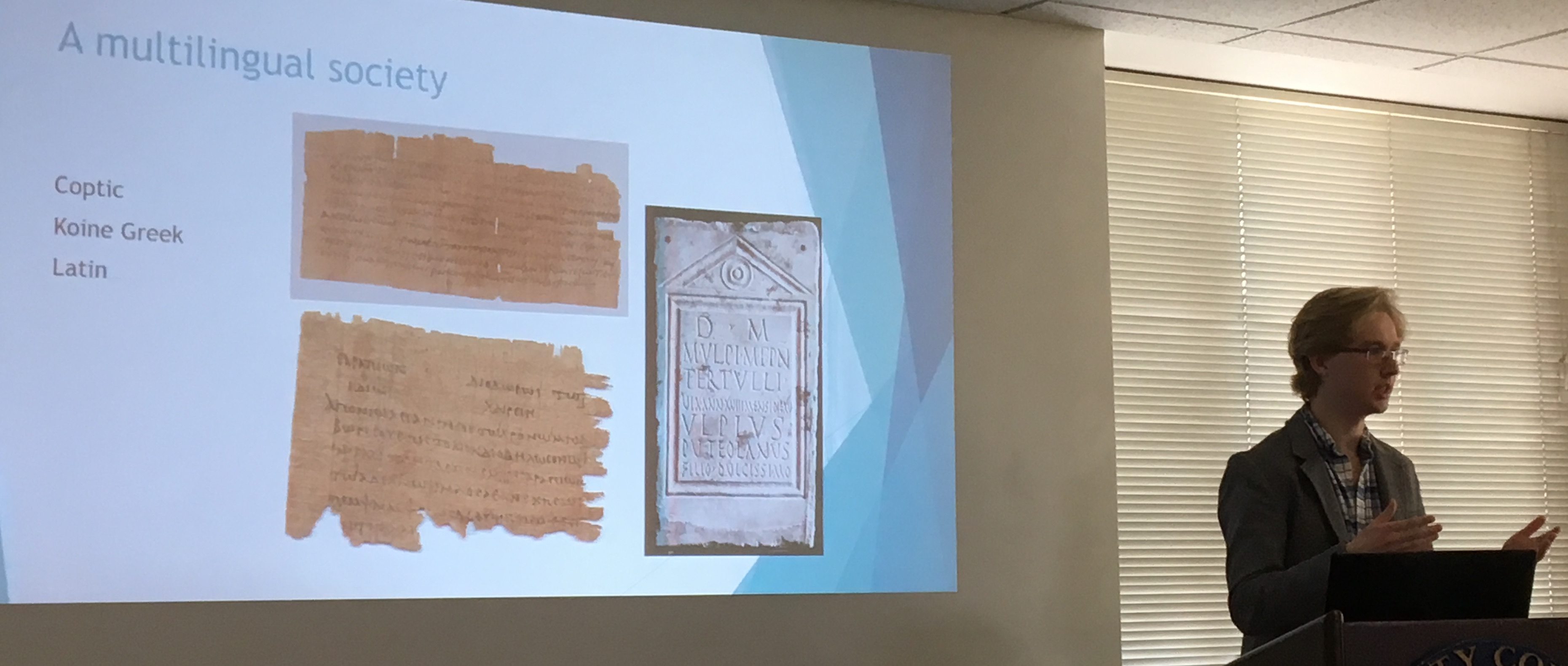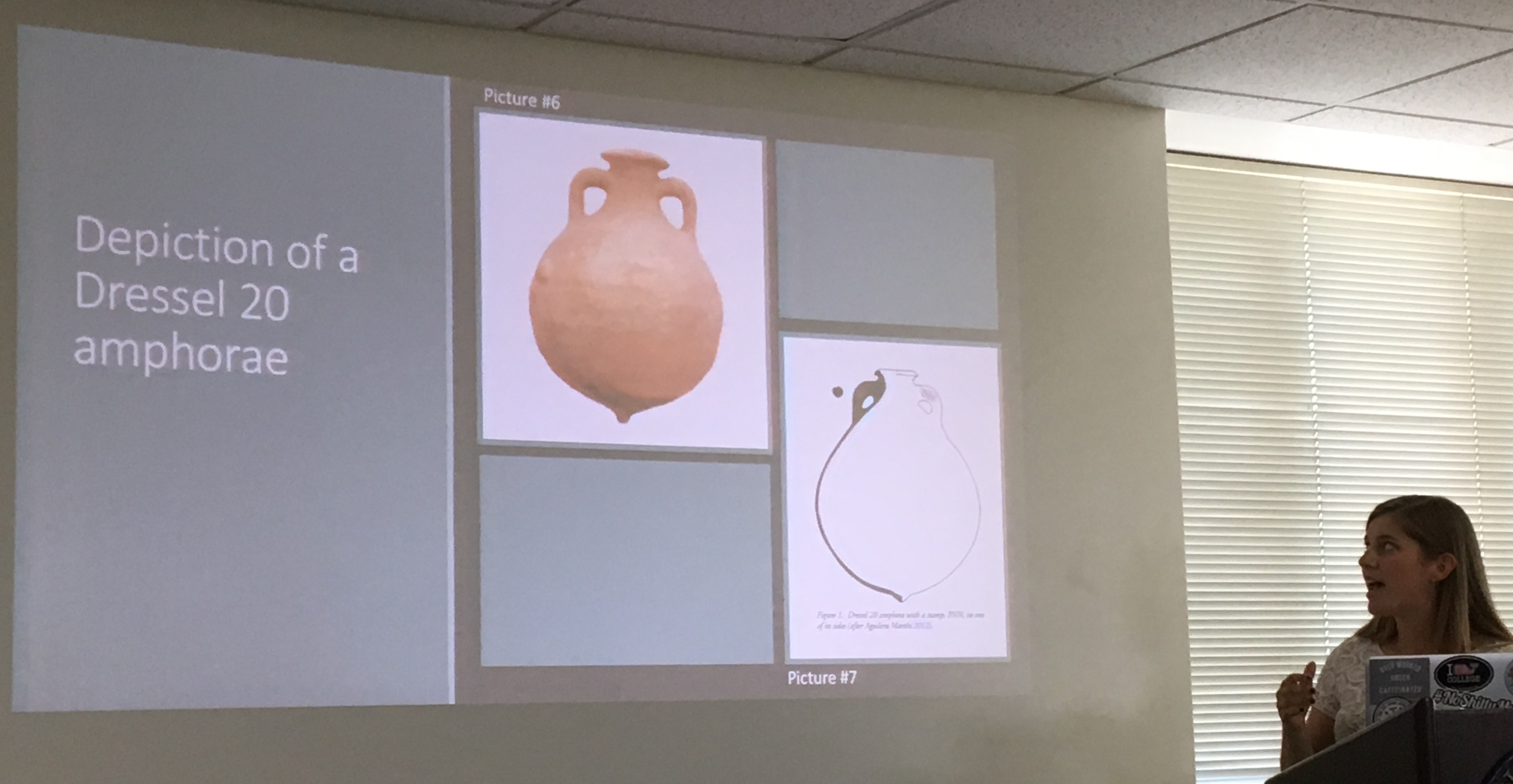On April 24th and 26th 2018 five graduating seniors presented the thesis projects that they undertook for the Classics department. All of them had taken the senior seminar course offered by Prof. Meredith Safran (Classics) and then elected to continue developing their projects over the spring semester.
 Dylan Ingram, a dual Classics and Mathematics major, presented his project (“Nominative for Accusative Case Interchange in the Numeral tessares in Greek Documentary Papyri, 310 BCE – 350 CE”) which was advised by Prof. Vincent Tomasso (Classics). Dylan looked into case syncretism, the linguistic phenomenon of the inflected endings of Greek words becoming the same over time. Dylan looked at papyri from Egypt in the Hellenistic and Roman periods for evidence that the nominative and accusative forms of the numeral 4 started becoming the same.
Dylan Ingram, a dual Classics and Mathematics major, presented his project (“Nominative for Accusative Case Interchange in the Numeral tessares in Greek Documentary Papyri, 310 BCE – 350 CE”) which was advised by Prof. Vincent Tomasso (Classics). Dylan looked into case syncretism, the linguistic phenomenon of the inflected endings of Greek words becoming the same over time. Dylan looked at papyri from Egypt in the Hellenistic and Roman periods for evidence that the nominative and accusative forms of the numeral 4 started becoming the same.
A study of the Roman Empire’s importation of olive was up next by Claudia Garrote. She pointed out that olive oil was an incredibly vital part of the Mediterranean diet: it formed a third of the so-called “Mediterranean triad” of foods, with grain and wine. She then explicatedthe mechanics of the olive oil trade from the Baetic region of Spain. Claudia’s project was advised by Prof. Gary Reger (Classics). Lydia Herndon, a double major in Classics and Religious Studies, discussed her project on the fourth-century AD Christian writer Ambrose of Milan (“‘A True Philosopher of Christ:’ Ambrose of Milan’s Reworking of Cicero’s De Officiis“). As Lydia described, Ambrose was an interesting individual who existed at the intersections of both his own elite identity (he was appointed as a bishop) and his desire to preach to non-elites. Her advisors were Profs. Lauren Caldwell (Classics & History) and Tamsin Jones (Religious Studies).
Lydia Herndon, a double major in Classics and Religious Studies, discussed her project on the fourth-century AD Christian writer Ambrose of Milan (“‘A True Philosopher of Christ:’ Ambrose of Milan’s Reworking of Cicero’s De Officiis“). As Lydia described, Ambrose was an interesting individual who existed at the intersections of both his own elite identity (he was appointed as a bishop) and his desire to preach to non-elites. Her advisors were Profs. Lauren Caldwell (Classics & History) and Tamsin Jones (Religious Studies). Will Verdeur talked to us about the relationship between the heroes of Vergil’s epic poem the Aeneid and the American writer Ernest Hemingway’s novel For Whom the Bell Tolls. Hemingway claimed the first-century BC/AD Vergil as one of his most important literary predecessors, though the ideology of Hemingway’s Robert Jordan is markedly different from that of Vergil’s Aeneas. Will’s project was directed by Profs. Safran (Classics) and Mrozwoski (English).
Will Verdeur talked to us about the relationship between the heroes of Vergil’s epic poem the Aeneid and the American writer Ernest Hemingway’s novel For Whom the Bell Tolls. Hemingway claimed the first-century BC/AD Vergil as one of his most important literary predecessors, though the ideology of Hemingway’s Robert Jordan is markedly different from that of Vergil’s Aeneas. Will’s project was directed by Profs. Safran (Classics) and Mrozwoski (English). Caroline Manns‘ thesis continued the theme this year of interdisciplinary reception studies. She considered the reception of the sixth-century BC Greek poet Sappho by the early twentieth-century American poets Hilda Doolittle and Audre Lorde. Her thesis was directed Profs. Meredith Safran of Classics and Robert Corber of Women’s and Gender Studies.
Caroline Manns‘ thesis continued the theme this year of interdisciplinary reception studies. She considered the reception of the sixth-century BC Greek poet Sappho by the early twentieth-century American poets Hilda Doolittle and Audre Lorde. Her thesis was directed Profs. Meredith Safran of Classics and Robert Corber of Women’s and Gender Studies.
Congratulations to all five on jobs well-done! The department will miss you when you graduate in just a few short weeks.
